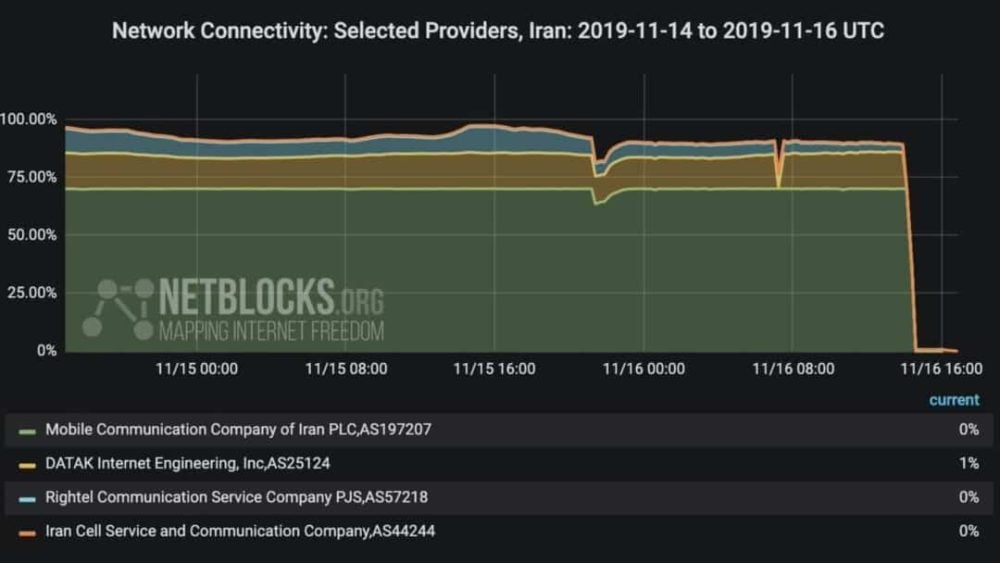Facebook
Twitter
LinkedIn
Pinterest
Reddit
Email
Print
 A NetBlocks graph shows the near-total internet shutdown across Iran between November 14–16, 2019, as the regime moved to crush nationwide protests by cutting off digital communication
A NetBlocks graph shows the near-total internet shutdown across Iran between November 14–16, 2019, as the regime moved to crush nationwide protests by cutting off digital communication
Three-minute read
In a stunning admission during a parliamentary session on July 22, 2025, the Iranian regime’s own officials laid bare the catastrophic consequences of their recent internet policies.
The Communications Minister for President Masoud Pezeshkian’s government, Sattar Hashemi, revealed that a 12-day, state-enforced internet shutdown inflicted a staggering 15 trillion toman loss on the country’s digital economy in a single month—a figure he noted is equivalent to the annual budget of some government ministries.
This self-inflicted economic wound, justified under the guise of national security, also triggered a 30% reduction in employment in the digital sector, directly jeopardizing the livelihoods of an estimated 10 million Iranians who depend on it. These figures, presented in the regime’s own Majlis (parliament), are not merely statistics; they are an indictment of a policy that prioritizes political control over national prosperity.
“Digital Caste System”: #Iran Codifies Internet Access by Loyaltyhttps://t.co/8uivTthV4y
— NCRI-FAC (@iran_policy) July 20, 2025
The “National Network”: A Security Failure, Not a Shield
The regime justified this digital blackout and its long-standing push for a walled-off “National Information Network” (NIN) as a necessary measure for national security. However, official reports from the same parliamentary session reveal this security apparatus to be a catastrophic failure.
Hashemi confirmed that during the shutdown, Iran was subjected to over 20,000 cyberattacks. The supposed resilience of the domestic network crumbled as major state-controlled banks were successfully breached. Bank Sepah, which handles payroll for military personnel, saw its online services collapse. Bank Pasargad and Bank Mellat were also compromised, with one hacker group claiming to have leaked data from over 32 million accounts.
This glaring vulnerability did not go unnoticed by members of parliament. Salman Zaker, a representative from Urmia, directly challenged the minister: “If [domestic platforms] were secure, why were the banks so vulnerable to cyberattacks?” Another MP, Farshad Ebrahimpour was even more blunt, stating, “In this 12-day war, it became clear that the National Information Network is not a network, but scattered and inefficient pieces.”
Internal Chaos and Contradictions: The Wolves Turn on Each Other
The fallout from this dual economic and security disaster has triggered open conflict within the regime’s political factions. In the Majlis, Hashemi attempted to deflect responsibility for the internet shutdown, placing the blame on unspecified “competent authorities and security and intelligence agencies.”
Yet, rather than reassessing the failed strategy, rival faction members like Parliament Speaker Mohammad Bagher Ghalibaf are demanding an acceleration of the very project that proved so vulnerable, calling the NIN one of the nation’s “most important national priorities.”
This dissonance was openly mocked within the parliament itself. MP Zahra Saeedi Mobarakeh pointed directly to the minister’s conflicting statements: “The minister’s words were contradictory… On one hand, he says we have stable security, on the other, he talks about these problems and the damages… The people are dissatisfied. We are not supposed to sit here and thank each other on the pretext of national unity.” This exchange exposes a regime in disarray, incapable of forming a coherent response as it scrambles to assign blame for a crisis of its own making.
#Iran’s Digital Apartheid: Regime Loyalists Flood the #Internet While the Rest of the Nation Goes Darkhttps://t.co/qFQw7Bi9wc
— NCRI-FAC (@iran_policy) June 20, 2025
A Tool of Repression, Not a Plan for Progress
The facts presented in the regime’s own parliament lead to an unavoidable conclusion: the relentless push for a “National Internet” is not about technological sovereignty or protecting the nation. It is an instrument of political survival, designed to construct a digital iron curtain that severs Iranians from the free flow of information and crushes dissent.
The project has already proven to be an economic disaster and a security liability. In a moment of striking candor, MP Ebrahimpour confessed the regime’s complete unpreparedness, admitting, “It was proven that we are not even ready to cut the global internet without creating disruption in the banking, educational, and health systems.”
The regime’s response to a crisis was to inflict massive, unnecessary damage on its own people and economy. Now, its only proposed solution is to build a bigger, more oppressive version of the system that just failed. This episode serves as a powerful testament to the fact that the regime in Tehran is, and always has been, the greatest threat to Iran’s security, stability, and prosperity.